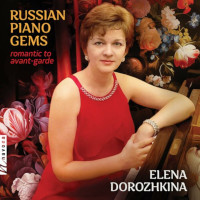Review by Huntley Dent
RUSSIAN PIANO GEMS: Romantic to Avant-Garde • Elena Dorozhkina (pn) • NAVONA 6576 (Download: 47:00) https://www.prestomusic.com/classical/products/9538859--russian-piano-gems196589934901
MOSOLOV Piano Sonata No. 4. GLINKA (arr. Balakirev) A Farewell to St. Petersburg: No. 10, "The Lark." SCRIABIN Etudes: op. 65/3; in c♯, op. 42/5. Prelude for the Left Hand in c♯, op. 9/1. TCHAIKOVSKY Dumka (Rustic Russian Scene), op. 59. RACHMANINOFF Morceaux de fantaisie: in g; in e♭, op. 3/1. Preludes: in g♯, op. 32/12; in c, op. 23/7.
Despite the stereotype of Russian gloominess, the highly accomplished pianist Elena Dorozhkina has an idealistic vision, based on her belief, as she tells us in her artist’s note, that music “has a unique power to change the human soul to more loving and compassionate.” Upholding her ideals, Dorozhkina has fashioned a program of Russian Piano Gems that tend toward the tender, reflective, and elegiac. Partly that’s due to the very nature of the music, as in Glinka’s nostalgic salon piece “The Lark,” or Tchaikovsky’s Dumka, op. 59, an example of his melodic gift applied to a meditation on melancholy.
But just as significant as her choice of music, Dorozhkina has a lovely expressive gift that allows her to find an intimate connection with the listener in every piece here. The last of Scriabin’s Three Etudes, op. 65, which is marked Molto vivace, is so rhapsodic and harmonically free that it can easily turn shapeless, but Dorozhkina maintains a strong through-line and excellent technique. In the fleeting passages where there is an opportunity, amid the insistent ostinato and emphatic accents, to take a beautiful sidelong glance, she immediately changes the mood. There is more consistent lyricism in Scriabin’s Prelude in C♯ Minor for the left hand, where Dorozhkina is very good at the music’s nuances—even at his most advanced (or eccentric, depending on your viewpoint), Scriabin maintained his connection to Chopin through such sophisticated shading of phrases.
Dorozhkina is very considerate in her approach, so that Scriabin’s demanding Etude, op. 42/5 is nicely balanced between technique and emotion—her reading is admirably Chopinesque. Rachmaninoff is much less elusive, but Dorozhkina offers a link to Scriabin in the first of the two Morceaux de fantaisie on the program, which feels like a continuation of Scriabin’s Etude. Dorozhkina graduated from the St. Petersburg Conservatory before coming to America, and she possesses a perfect sympathy for Rachmaninoff, making the two selected Preludes flow with natural ease, leaving not the slightest hint of difficulty. Her reading of the Prelude in C Minor, op. 23/7 is a striking example of the pianist’s refined virtuosity, which finds lyrical expression even in a cascade of fast passagework.
I’ve focused first on the Romantic portion of this recital, by far the majority of it, in case anyone is frightened off by “avant-garde” in the headnote. Russian avant-gardism has played a huge role in producing composers as great as Alfred Schnittke and Sofia Gubaidulina in the post-Stalinist era. Much less well known in the West is Alexander Mosolov (1900–73), whose entire career was in the Soviet Union. After noting his position as a leader of the avant-garde, the program notes continue, “Though he was one of the most prolific composers of the 20th century, the vast majority of his works are believed lost or otherwise unaccounted for.”
Mosolov’s single-movement Piano Sonata No. 4 is sometimes virtuosic on the order of Liszt and Rachmaninoff, but in a wildly different idiom that is “highly chromatic and dissonant, with aggressive machine-like rhythms, dense texture, and a wide range of extreme piano registers.” The music is varied enough to contain lyrical, lullaby-like sections during its 10-minute length. Still, it was daring for Dorozhkina to place the piece first on the program, and despite her totally dedicated performance, I’m still not sure that avant-garde and gem can be spoken in the same breath.
In the interwar years American classical music took flight thanks to the influx of superb pianists, violinists, and composers fleeing Hitler, but less recognized is how this country has benefited from the arrival of superb Russian pianists since the fall of the Soviet Union. Dorozhkina, who lives in Atlanta, exemplifies this, and in addition she’s apparently a multi-tasker of unlimited energies in her roles as soloist, collaborative pianist, and award-winning teacher (she trained in all three specialties in St. Petersburg). Her debut disc reveals at the same time a remarkable talent and an idealistic vision. This is a thoroughly successful and musically satisfying debut on disc. Huntley Dent






















